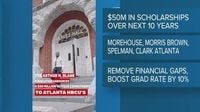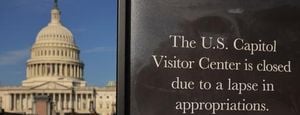In a landmark move for Atlanta’s educational landscape, the Arthur M. Blank Family Foundation has pledged $50 million over the next decade to support students at the city’s four historically Black colleges and universities (HBCUs): Clark Atlanta University, Morehouse College, Morris Brown College, and Spelman College. Announced on October 13, 2025, this donation represents the largest single gift the foundation has made to Georgia’s HBCUs, and it comes at a critical time as federal funding policies for higher education are in flux.
The $50 million is earmarked for so-called “gap scholarships”—funds designed to help nearly 10,000 students who are close to graduating but have run out of financial aid. The initiative’s central goal is to ensure that financial hardship does not become the final barrier for students who have already invested years into their education. As Fay Twersky, president of the Arthur M. Blank Family Foundation, told the Associated Press, “These grants are a material investment in hope.”
The impact of the donation is expected to be far-reaching. Each of the four beneficiary institutions serves a high percentage of federal Pell Grant recipients—students from lower-income backgrounds who are often at greatest risk of dropping out due to financial shortfalls. By targeting this vulnerable group, the foundation hopes to boost graduation rates and create a ripple effect of opportunity in Atlanta and beyond.
Arthur Blank, the billionaire co-founder of The Home Depot and owner of the Atlanta Falcons and Atlanta United, has long been a major force in philanthropy. With a net worth exceeding $11 billion, according to Forbes, Blank has signed the Giving Pledge—an agreement among some of the world’s wealthiest individuals to donate at least half their fortunes to charitable causes. Over the years, his family foundation has contributed more than $1.5 billion to initiatives spanning education, healthcare, the arts, and community development.
This latest $50 million commitment is a continuation of that legacy. Previous gifts from the foundation include $10 million to Spelman College for the creation of an innovation lab, and $6 million to refurbish athletic facilities at several HBCUs, including Clark Atlanta University, Albany State, Miles College, and Savannah State. Just last year, the foundation invested $6.5 million to convert grass athletic fields to turf at Albany State, Clark Atlanta, Miles College, and Savannah State, a move that is expected to save the schools money on maintenance over time.
The timing of the donation is significant. Only days before the announcement, the Trump administration revealed a one-time federal allocation of nearly $500 million to HBCUs and tribal colleges. However, other federal programs that support colleges with large Hispanic and minority populations, including diversity initiatives, are facing reductions. In this changing landscape, the Blank Foundation’s multi-year commitment provides a measure of stability—and hope—for Atlanta’s HBCUs.
Dr. F. DuBois Bowman, president of Morehouse College, praised the donation’s potential to transform student outcomes. “This monumental investment will empower our students to remain focused on their academic studies and ensure that their talent, ambition, hard work, and integrity, not financial hardship, will determine their futures,” Bowman told the Associated Press.
Arthur Blank himself underscored the personal connection he feels to Atlanta and its educational institutions. “Atlanta holds a special place in my heart and will always be an integral part of our family foundation’s giving,” Blank said in a statement. “We know Spelman, Morris Brown, Morehouse, and Clark Atlanta are vital to Atlanta’s future, and we are deeply committed to supporting the students who will carry that legacy forward. We recognize that these campuses, like many across the country, are home to generations of students whose promise inspires us. Our hope is that by helping more students earn their degrees, launch successful careers, and become alumni who give back, we are investing in a cycle of opportunity that benefits young people and their families in Atlanta and communities across the nation for years to come.”
The economic and social significance of Atlanta’s HBCUs is hard to overstate. Collectively, these institutions contribute around $1 billion in annual economic activity to the region. They also serve as powerful engines of social mobility: according to the foundation, graduates often move from the lowest 40% of household income to the top 60%. This upward trajectory doesn’t just benefit individual students—it has positive effects for their families and the broader community.
Graduation rates, however, remain a challenge at some of these schools. According to hbcunews.com, Spelman College leads among the four with a 68% graduation rate, while Morehouse and Clark Atlanta lag behind at 36% and 34%, respectively. By providing targeted financial support to students on the cusp of finishing their degrees, the Blank Foundation hopes to close these gaps and set more students on the path to successful careers.
The connection between Atlanta’s HBCUs and the city’s broader cultural and professional life runs deep. The Atlanta Falcons, for example, have a storied history with HBCU alumni. Claude Humphrey, a legendary defensive end for the Falcons and a graduate of Tennessee State University (formerly Tennessee A&I), played 127 games for Atlanta between 1968 and 1978 and was inducted into the Pro Football Hall of Fame in 2014. Stories like Humphrey’s underscore the role HBCUs have played in nurturing talent and leadership, not just in Atlanta but across the country.
The Blank Foundation’s donation is about more than just immediate financial relief. It’s about creating a long-term cycle of opportunity—one in which today’s students become tomorrow’s successful professionals and, eventually, alumni who give back to their alma maters and communities. As the foundation put it in its statement to the Associated Press, “Our hope is that by helping more students earn their degrees, launch successful careers, and become alumni who give back, we are investing in a cycle of opportunity that benefits young people and their families in Atlanta and communities across the nation for years to come.”
In a city where HBCUs have historically nurtured generations of African-American leaders, the Blank Foundation’s $50 million pledge is more than a donation—it’s an investment in people, in communities, and in the enduring promise of education. By focusing on students closest to graduation, the initiative ensures that talent, determination, and academic merit—not financial constraints—will decide the future of Atlanta’s next generation of leaders.





